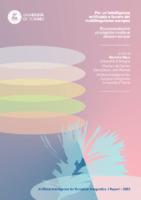Sfoglia documenti (2 in totale)
Sort by:
Languaging Identities in Changing TimesChallenges and opportunities
Languaging Diversity is an international biennial conference of the I-Land Inter-university Research Center, an international and interdisciplinary center based at the University of Napoli L’Orientale, Italy. It welcomes scholars interested in a variety of fields such as Linguistics, Social Sciences, and the Humanities. The concepts of identity and diversity are at the core of the conference series. These are investigated cross-culturally, cross-linguistically and from interdisciplinary perspectives.
Following the seven successful events hosted by the Universities of Napoli (2013), Catania (2014), Macerata (2016), Cagliari (2017), Antwerp (2018), Teruel (2019), and Lille (2021), the eighth edition of the Languaging Diversity conference (LD2023) is organized by the University of Torino, Italy.
The present volume is a collection of extended abstracts submitted to the 8th edition of the Languaging Diversity Conference (LD2023) titled ‘Languaging identities in changing times: Challenges and opportunities’. The 2023 version of the conference is jointly organised by the Department of Foreign Languages, Literature and Modern Cultures and the Department of Cultures, Politics and Society at the University of Torino, Italy.
The theme of the conference focuses on the representation and the languaging of identities against the backdrop of our rapidly changing societies. Cultures, traditions, and customs are evolving very quickly; in the same way, the interpretation of the concept of identity is undergoing a significant transformation. Languaging Diversity 2023 brings together researchers from a wide range of research disciplines and from diverse cultural and linguistic backgrounds. The contributions explore how people embrace the opportunities and overcome the challenges of current times to create a space for their identities to be acknowledged and recognized.
The book of abstracts gathers four plenary talks, four panels that include twenty presentations, seventy-two parallel presentations and six poster presentations, totalling a number of 102 talks. The abstracts discuss the conference theme in relation to gender and sexuality, ethnicity, disability, ageism, religion, ecology, medicine and science, media, politics, the law, education, and learning. The abstracts in this volume also reflect a broad range of the spectrum of theoretical and analytical approaches to study the interface between language and identity such as ethnographic, case studies, multimodal, multilingual, translational, textual and corpus-based methods.
Per un’intelligenza artificiale a favore del multilinguismo europeo Raccomandazioni strategiche rivolte ai decisori europei How artificial intelligence can further European multilingualism Strategic recommendations for European decision-makers
Il presente report intende fornire ai policy e decision makers dell’Unione europea degli argomenti e dei dati utili al fine d’investire su un’intelligenza artificiale a favore del multilinguismo europeo, proponendo quattro raccomandazioni specifiche. A tale scopo, il gruppo di lavoro sulle attività linguistiche che si è costituito attorno alla rete del Centro d’eccellenza Jean Monnet Artificial Intelligence for European Integration (AI4EI) a Torino ha inteso far dialogare persone esperte nei settori della linguistica, della glottodidattica, della traduzione, dell’analisi del discorso, dell’informatica e dell’ingegneria per l’informazione così da produrre dati e ricerche sull’impatto dell’IA nel settore dell’industria delle lingue e sul multilinguismo dell’Unione europea.
This report aims to provide Eueropean Unione policy and decision makers some arguments and data or facts useful in order to invest in artificial intelligence for European multilingualism, proposing four specific recommendations. To this end, the working group on linguistic language, which was formed around the network of the Jean Monnet Center of Excellence Artificial Intelligence for European Integration (AI4EI) in Turin, Italy, aimed to bring together people who are experts in the the fields of linguistics, glottodidactics, translation, discourse analysis, computer science and information engineering in order to produce facts and research on the impact of AI in the language industry and on multilingualism in the European Union.
This report aims to provide Eueropean Unione policy and decision makers some arguments and data or facts useful in order to invest in artificial intelligence for European multilingualism, proposing four specific recommendations. To this end, the working group on linguistic language, which was formed around the network of the Jean Monnet Center of Excellence Artificial Intelligence for European Integration (AI4EI) in Turin, Italy, aimed to bring together people who are experts in the the fields of linguistics, glottodidactics, translation, discourse analysis, computer science and information engineering in order to produce facts and research on the impact of AI in the language industry and on multilingualism in the European Union.


